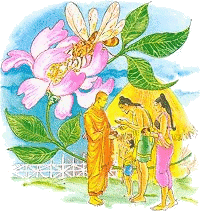Jhanas -
Question and Answer
By the Venerable U Vimalaramsi

Question:
Hi,
I did not realise there were different levels within the same jhana.
What is the difference between these levels? How do you work with a
single jhana level?
With metta to all
S
Answer:
Dhamma Greetings,
The way it works is if the meditator can only
occasionally attain a jhana but is not able to attain it
regularly then that is the lowest part of that Brahmaloka. When
the meditator is able to get in and out of jhana pretty regularly
then that is the middle part of that Brahmaloka. When the
meditator has gained mastery of going into and out of a jhana
quickly and easily everytime they want to then this is the highest
attainment of that particular Brahmaloka. This holds true for the
first three jhanas. In the fourth jhana there are two levels of
attainment to enter the Brahmalokas for 500 Maha Kappas this
attainment has to do with what the meditator is doing while in the
4th jhana focusing on deep stillness or developing the ability to
see the subtleties of dependent origination.
The arupa jhanas last for very long periods of
time. I teach the meditator how to experience all of the lower
jhanas as well as all of the arupa jhanas. Then on to the
cessation of perception and feeling. When the meditator comes out
of that cessation of perception and feeling they will see up close
and personal the links of dependent origination. This is such a
strong and eye opening experience that the meditator then
experiences the unconditioned state of nibbana. Why does the
unconditioned state arise when the meditator sees the cessation of
all of the links of dependent origination? Because there is no
condition that arises to start the entire process of dependent
origination thus without a cause for the ignorance to arise there
is the unconditioned state! Do you see?
So even though a meditator can experience all of the jhanas there
is still some work to do. I hope this has been helpful!
Maha-Metta 2U
always
|